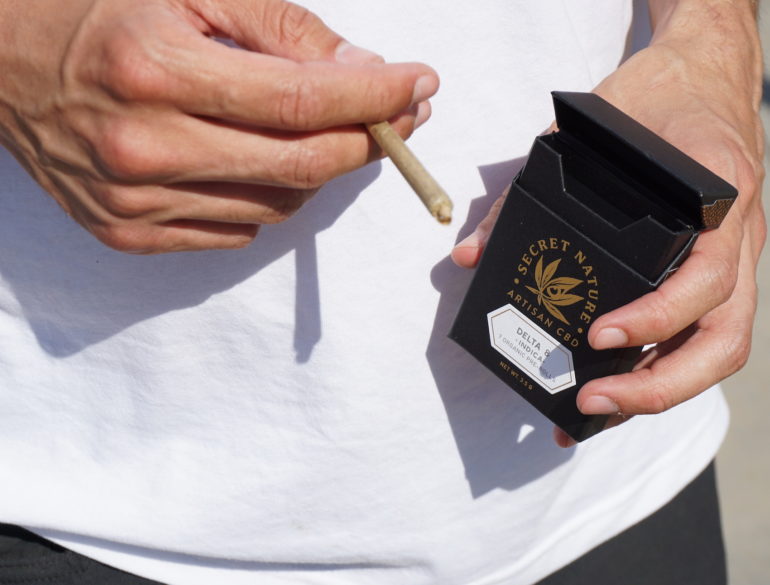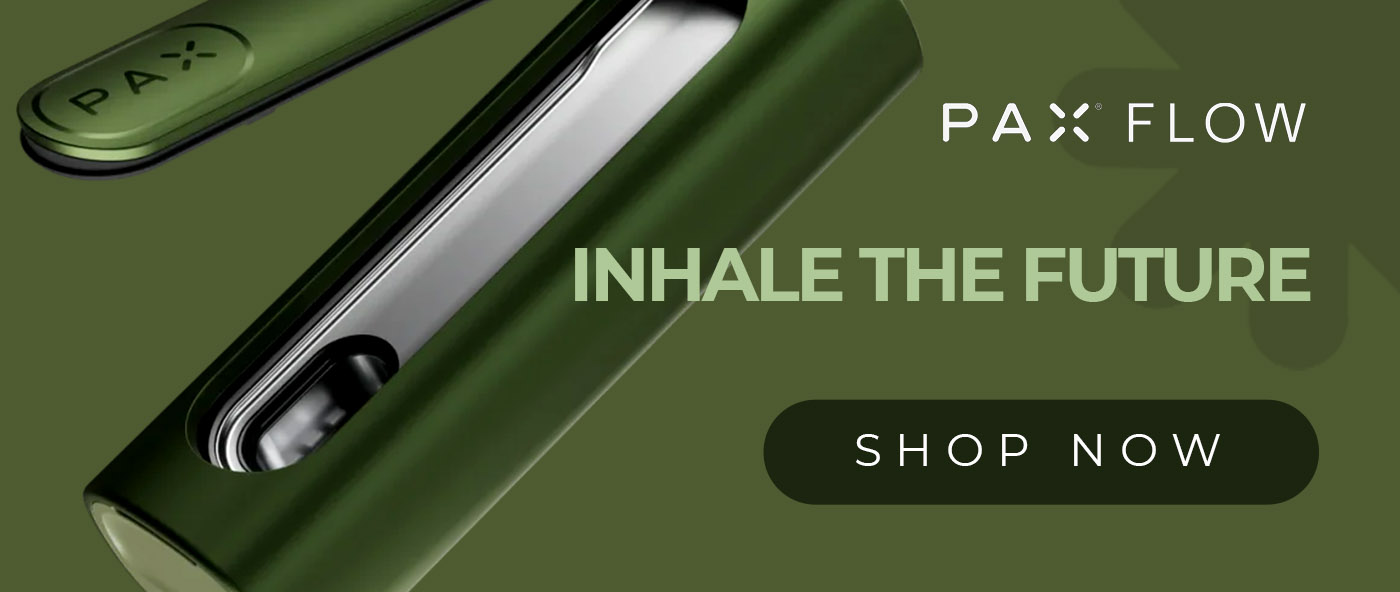As a psychoactive cannabinoid, delta-8 THC sure does get you high. And, while it may not get you as high as delta-9 THC, many consumers find it to be a good option for gentle, soothing results.
However, this newer cannabinoid still presents a lot of unknowns — and even some risks — that consumers need to know.
So, Does Delta-8 Get You High? (And Other Effects)
Simply put, yes, delta-8 THC can definitely get you high.
This cannabinoid is a THC variant and offers a mild dose of psychoactivity. If you consume delta-8, you’re likely going to feel intoxicated along with supportive results like relaxation and comfort.
Many people note that their delta-8 THC products feel much less powerful than delta-9 THC, causing companies to come to the conclusion that delta-8 is inherently less potent than delta-9.
Adie Rae, Ph.D. and neuroscientist, explains to us that this may not necessarily be the case.
“There are actually no human studies to support the idea that delta-8 is weaker than delta-9. What few scientific studies we have were done in animals,” the doctor explains. “I certainly won’t deny that people may perceive the effects differently, but this may partly be due to the facts that 1) delta-8 products may not be accurately labeled and 2) cannabinoids are well known for their expectancy effects (people experience what they expect to experience, sometimes called the placebo effect).”
So, while one person may find delta-8 to be more gentle, this may not always be the case — especially for all consumers.
However, it’s worth noting that some consumers could benefit from the more gentle psychoactive effects of delta-8 THC, if they experience them as such. The high tends to feel less overwhelming than delta-9’s, making delta-8 beneficial for those with high stress or high anxiety levels. People report the cannabinoid feels quite relaxing overall, suggesting it may be best for end-of-the-day consumption.
Interestingly enough, many consumers have also reported that a delta-8 THC high helps them feel more focused and concentrated. Still, these results vary from person to person.
Dr. Tanja Bagar is the CEO of the ICANNA Institute, the International Institute for Cannabinoids, and she had this to say about the medical benefits of delta-8 THC:
“In Europe, we prescribe or suggest to many cancer patients undergoing chemotherapy to use delta-8 THC to alleviate nausea and pain either connected with the disease itself or the chemotherapy. We have found it to be very effective and for most patients more manageable than delta-9 THC. The preferred route of intake for patients in this case is vaporization, where delta-8 THC is mixed with a specific terpene profile. This way patients can get quick relief from nausea and can manage their pain effectively. We started exploring the benefits of delta-8 THC after reading the paper by Dr. Mechoulam entitled “An efficient new cannabinoid antiemetic in pediatric oncology”, where they found delta-8 THC to be very effective for side effects of chemotherapy.”
Since delta-8 THC does get you high, you must be responsible with consumption — as you would with any THC variant. You shouldn’t drive or operate any machinery after consuming delta-8, and it’s not something you should consume if you have anything pressing on your to-do list.
Delta-8’s Side Effects and Safety Risks
The side effects of delta-8 are not uncommon; in fact, they’re pretty similar to most intoxicating cannabinoids. If you have a poor reaction to delta-8 THC, you may find yourself experiencing the following side effects:
- Dry eyes or dry mouth
- Red eyes
- Dizziness
- Headaches
- Fatigue
- Nausea or vomiting
- Anxiety or paranoia
- Impaired motor skills
Typically, these side effects can be negated with proper dosing and a slow introduction of the cannabinoid while also monitoring how your body feels. However, some bodies simply don’t like cannabinoids like delta-8, and these reactions are inevitable.
In terms of next-day side effects, some people report that the cannabinoid makes them feel a bit groggy. It may be slightly more difficult to wake up and feel clear-headed and motivated after consuming delta-8 the day prior. But, this varies widely depending on the person.
Potential Safety Risks of Delta-8 THC
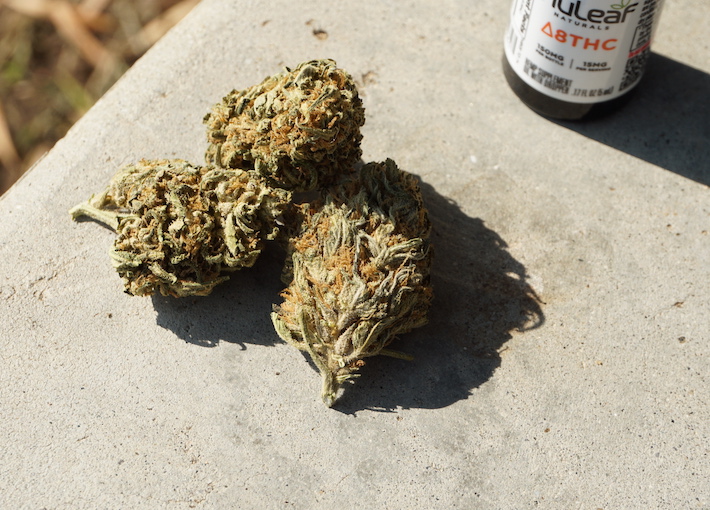
When it comes to the overall safety of delta-8 THC, it’s important to approach this cannabinoid with caution, remembering that it is not a natural compound within products.
As Dr. Rae points out, “We have no safety data whatsoever about these products. If people are having adverse reactions, it could be due to any number of factors: improper labeling, toxic ingredients, bad manufacturing practices… we simply don’t know. There is a dire need for more research and regulation.”
This lack of regulation has caused a lot of cannabis professionals and healthcare experts to be concerned. So concerned, in fact, to the point where many professionals cannot recommend people to try these products — at least not yet.
“I think that all lab-made cannabinoids should be researched for their safety and potential benefits before being sold on the free market. There is a lot of unethical, opportunist capitalism happening right now, and public health should come first,” explains Dr. Rae.
She goes on to explain that while this phenomenon “may be a step forward for the cannabis community, [it] further highlights the ridiculousness of federal cannabis prohibition.” She hopes that the community can leverage this ambiguous, potentially dangerous situation for sensible drug regulation and better research.
Furthermore, co-founder of Summit THC Dave Baugh tells us that proper labeling matters – a whole lot. He says, “Proper warnings, labeling, and expectations are CRUCIAL to our industry’s validity and customer care. There are plenty of bad actor companies that unfortunately make D8 look like candy, ripoff candy labels to try to replicate brands (which has been associated with children eating D8 edibles), and not sourcing D8 extracts and manufacturing with quality and care.”
Baugh further explains that companies like his are focused on providing ample warnings, expectations, and instructions for responsible use that go well beyond current hemp labeling requirements, and they’re proud to carry this torch of responsibility in the industry.
Properly Dosing Your Delta-8 Products
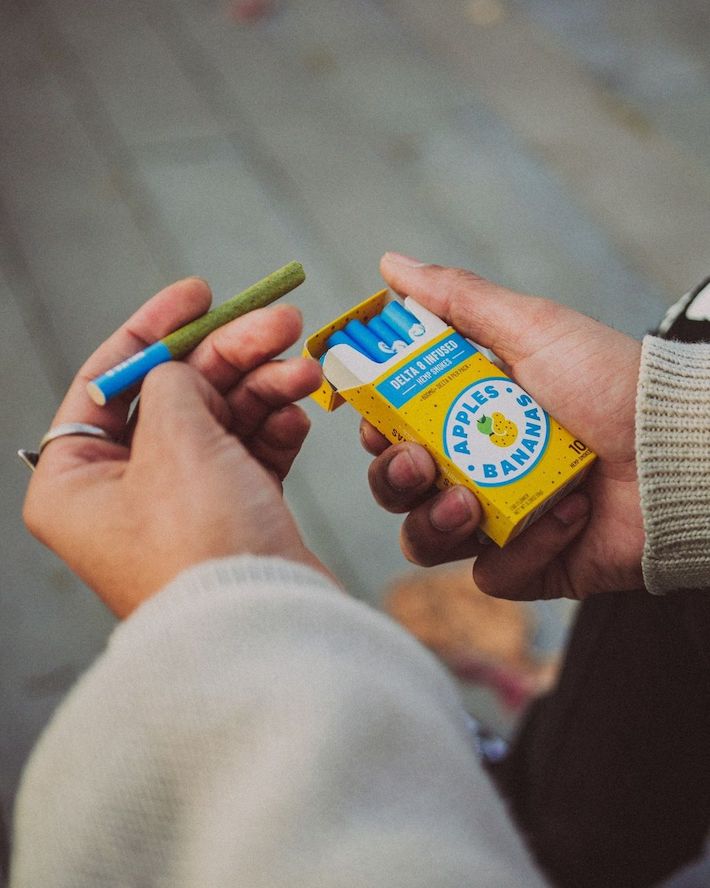
In order to have the best delta-8 experience possible, proper dosing is key.
“What may be more intense for me might be very mild for someone else – so we always suggest people start small (and wait at least an hour or until next time) before taking more. Personally, 7.5mg of D8 is plenty for me, which would be 1/2 of our Summit gummies, and is our suggested serving size. However, more frequent users or marijuana users may want a bit more to get a more palpable experience – and we know many of our customers take 25-50mg of D8 to achieve this effect,” Baugh says.
All in all, you want to start low. Most people find that 5 mg is a good dose for experiencing gentle to mild effects; however, 25 mg is considered more moderate. For anyone with a high tolerance or chronic conditions, about 50 mg or above will likely be most effective.
RELATED: Does Delta-8 THC Make You Fail a Drug Test?
If you’ve never consumed delta-8 THC before, it’s essential to start with a low dosage and then slowly make your way up to the amount that works best for you. Consuming too much delta-8 at once can result in the negative effects we discussed above, so taking it slow is always ideal.
Frequently Asked Questions
How Does a Delta-8 High Compare to a Marijuana High?
A delta-8 high is often described as providing a slightly less intense high than delta-9, the main compound in marijuana. While delta-8 produces psychoactive effects like delta-9, people tend to find the high to be a bit more relaxing and level-headed, it is also less likely to leave you feeling anxious or overwhelmed.
RELATED: Delta-8 THC vs. CBD
How Long Does Delta-8 THC Take to Kick in?
The onset time of effects depends on the method of consumption. If you smoke or vape delta-8 THC, you will experience effects within minutes. If you consume it orally (like in a gummy or a capsule), then the effects can take anywhere from 45 minutes to 2 hours to kick in.
How Long Do the Effects Last?
How long the effects of your delta-8 products last depends on the type of product you consume: inhaled products like flower or vapes will have shorter highs, typically lasting about 1-2 hours. When taken orally, you may experience the effects of your delta-8 product for anywhere from 4-8 hours.
Does Delta-8 Give You the Munchies?
Yes, delta-8 THC can stimulate the appetite and give you the munchies.
Does Delta-8 Make You More Tired or More Energized?
Most people find that delta-8 THC makes them feel more tired and relaxed than energized. However, it is common for people to feel more clear-headed and focused after consuming delta-8. Still, the cannabinoid is well-known for being quite calming and good for heavy body relief.
Can Delta-8 Be Effective for Pain? What About Stress and Sleep?
Yes, delta-8 THC can be effective for pain, as well as for stress and sleep. Since the delta-8 cannabinoid works with the endocannabinoid system and both CB1 and CB2 receptors in the body, it has the ability to work with various processes, including pain sensation, sleep, and even mood. It is a partial agonist of the CB1 receptor, with a lower binding affinity than delta-9 THC, and a very similar affinity for CB2. Delta-8 THC was shown to have pain-relieving effects and can be neuroprotective.
How Does Delta-8 Make You Feel?
Based on a survey CBD Oracle conducted back in 2021, here are just some of the statements we received from 114 delta-8 consumers when asked about their experience:
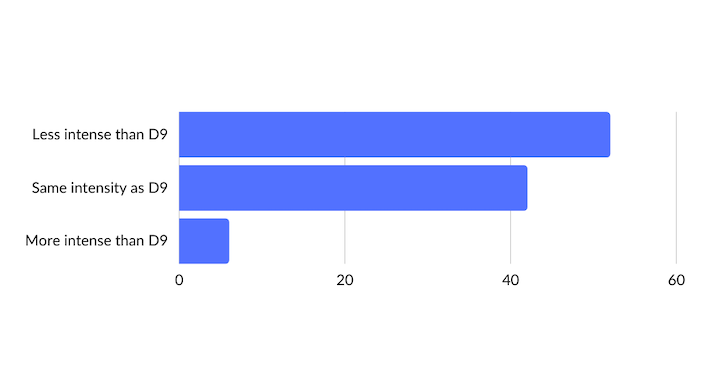
- “Delta-8 for me is a cool buzz without being high. It’s a slow rising peak that slowly subsides as it decreases. It helps throughout the day especially when you don’t feel like getting high.”
- “Delta-8 helped me sleep and feel more refreshed in the morning. It also really relaxes me and makes me worry free. No paranoia or anxiety. Other than the minor side effects, it helped me with my anxiety and depression. I recommend it for those who haven’t tried it.”
- “It makes me feel noticeably more anxious and paranoid and doesn’t provide me with as much relief from stress or pain. However, it does make me feel more sleepy so I can say it helps for insomnia. I also noticed more dry mouth and eyes as a result.”
- “It’s OK but nothing beats regular ol thc.”
- “Delta-8 was felt more in my body than my head. I felt very comfortable sitting down, and did not feel like moving too much. Delta-9 products allow for a different range of effects. It’s not always just a “stuck on the couch” high.”
- “Delta 8 is like diet cannabis. I prefer delta 9 but it produces a milder high so you don’t feel so couch locked.”
Understanding the Complexities of Delta-8 THC

So, do delta-8 products get you high? You bet. But, this doesn’t necessarily mean they are the perfect product for you.
As our experts have mentioned, delta-8 THC and its products are severely under-regulated, posing risks for everyday consumers just seeking relief. If you’re dead-set on trying delta-8 products, then it is important to prioritize safety and quality, supporting only the top-rated brands on the market and taking extra precautions for consumption.
References (15)
- Abrahamov, A., Abrahamov, A., & Mechoulam, R. (1995). An efficient new cannabinoid antiemetic in pediatric oncology. Life sciences, 56(23-24), 2097–2102. https://doi.org/10.1016/0024-3205(95)00194-b
- Kruger, Jessica S., and Daniel J. Kruger. Delta-8-THC: Delta-9-THC’s Nicer Younger Sibling? Journal of Cannabis Research, vol. 4, no. 1, 4 Jan. 2022, https://doi.org/10.1186/s42238-021-00115-8
- Kruger, Daniel J., and Jessica S. Kruger. Consumer Experiences with Delta-8-THC: Medical Use, Pharmaceutical Substitution, and Comparisons with Delta-9-THC. Cannabis and Cannabinoid Research, 19 Nov. 2021, https://doi.org/10.1089/can.2021.0124
- Tagen, Michael, and Linda E. Klumpers. Review of Delta‐8‐Tetrahydrocannabinol (Δ8 ‐THC): Comparative Pharmacology with Δ9‐THC. British Journal of Pharmacology, June 2022, https://doi.org/10.1111/bph.15865
- Gugliandolo, A., Blando, S., Salamone, S., Caprioglio, D., Pollastro, F., Mazzon, E., & Chiricosta, L. (2023). Δ8-THC Protects against Amyloid Beta Toxicity Modulating ER Stress In Vitro: A Transcriptomic Analysis. International journal of molecular sciences, 24(7), 6598. https://doi.org/10.3390/ijms24076598
- “American Academy of Neurology: Neurology Resources | AAN.” www.aan.com. Accessed 29 June 2023.
- Andreis, K., Billingsley, J., Naimi Shirazi, K. et al. Cannabinoid CB1 receptors regulate salivation. Sci Rep 12, 14182 (2022). https://doi.org/10.1038/s41598-022-17987-2
- Goyal, H., Awad, H. H., & Ghali, J. K. (2017). Role of cannabis in cardiovascular disorders. Journal of thoracic disease, 9(7), 2079–2092. https://doi.org/10.21037/jtd.2017.06.104
- Kirkham, Tim C. Cannabinoids and Appetite: Food Craving and Food Pleasure. International Review of Psychiatry, vol. 21, no. 2, Jan. 2009, pp. 163–171, https://doi.org/10.1080/09540260902782810
- Li, Xiaoxue, et al. The Effects of Consuming Cannabis Flower for Treatment of Fatigue. Medical Cannabis and Cannabinoids, 13 Apr. 2022, pp. 76–84, https://doi.org/10.1159/000524057
- Prashad, Shikha, and Francesca M Filbey. Cognitive Motor Deficits in Cannabis Users. Current Opinion in Behavioral Sciences, vol. 13, Feb. 2017, pp. 1–7, https://doi.org/10.1016/j.cobeha.2016.07.001
- Sharpe, Lara, et al. Cannabis, a Cause for Anxiety? A Critical Appraisal of the Anxiogenic and Anxiolytic Properties. Journal of Translational Medicine, vol. 18, no. 1, 2 Oct. 2020, https://doi.org/10.1186/s12967-020-02518-2
- Sorensen, Cecilia J., et al. Cannabinoid Hyperemesis Syndrome: Diagnosis, Pathophysiology, and Treatment—a Systematic Review. Journal of Medical Toxicology, vol. 13, no. 1, 20 Dec. 2016, pp. 71–87, https://doi.org/10.1007/s13181-016-0595-z
- Thayer, Amanda, et al. THC Regulates Tearing via Cannabinoid CB1 Receptors. Investigative Ophthalmology & Visual Science, vol. 61, no. 10, 27 Aug. 2020, p. 48, https://doi.org/10.1167/iovs.61.10.48
- Yazulla, Stephen. Endocannabinoids in the Retina: From Marijuana to Neuroprotection. Progress in Retinal and Eye Research, vol. 27, no. 5, 1 Sept. 2008, pp. 501–526, https://doi.org/10.1016/j.preteyeres.2008.07.002
